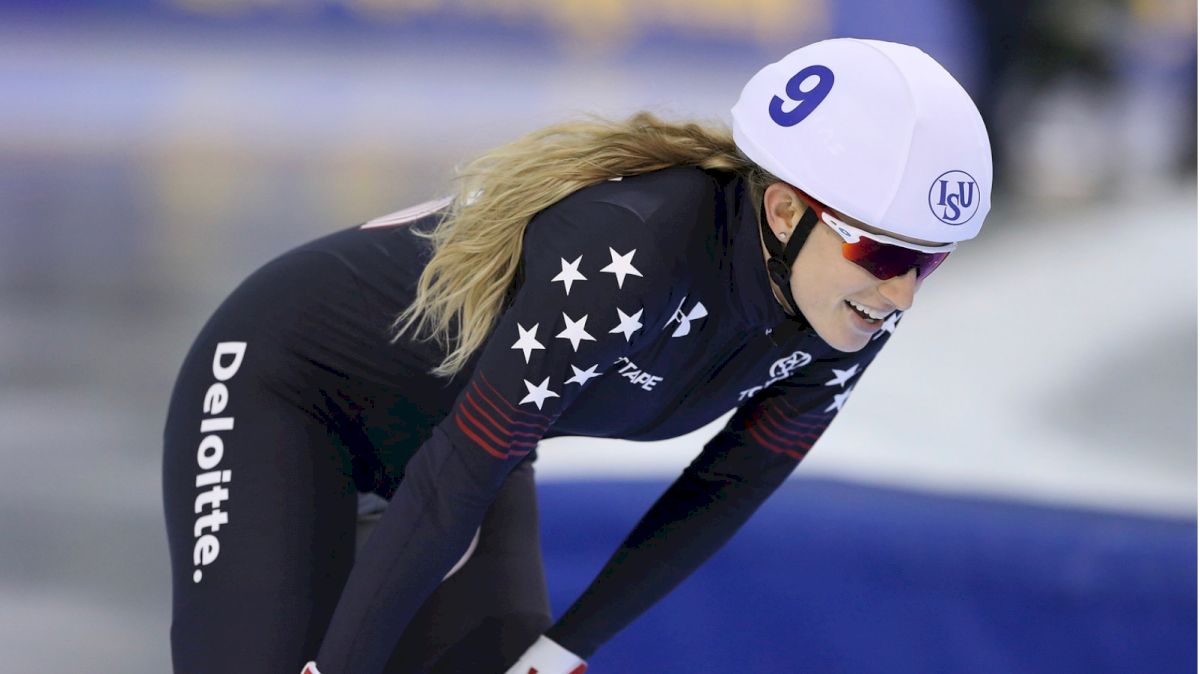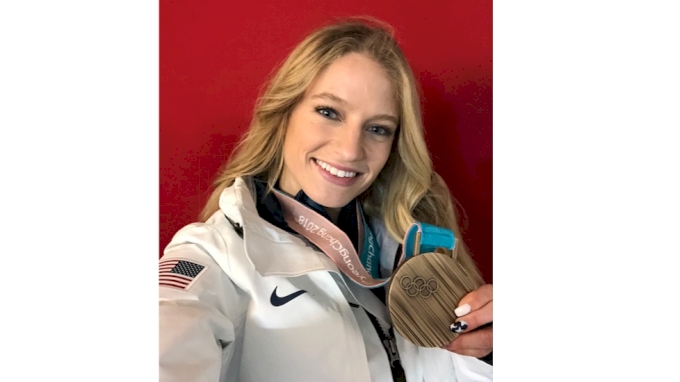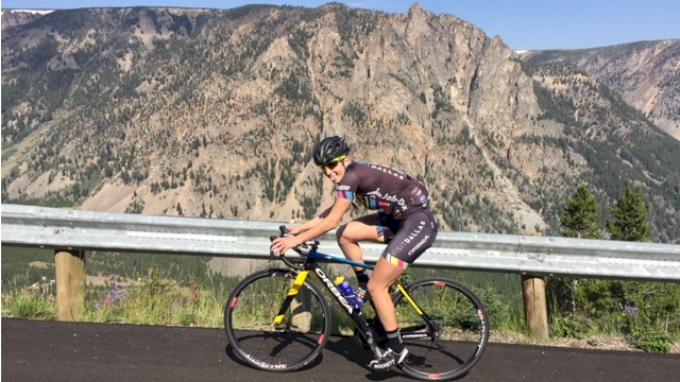A Moment In Time With Olympic Bronze Medalist Mia Manganello
A Moment In Time With Olympic Bronze Medalist Mia Manganello
Manganello took home a bronze medal in the team pursuit at the winter Olympics in Seoul, and she'll soon be getting back on her bike to start pro racing.

What do Eric Heiden, Connie Carpenter, Christine Witty, Clara Hughes, Christa Rothenburger, and Mia Manganello have in common?
All are amazing cyclists—and decorated speed skaters. (In fact, all but Mia have been to the Olympics for both sports.) Something about speeding around an ice rink and speeding around a velodrome or crit course seems to strike a chord for racers.
It sounds weird, but it does makes sense.
According to the IndySpeed Sports Club—an amateur club in central Indiana that promotes Olympic speed-skating and cycling—the two utilize similar muscle groups and body positioning, the training seasons are complementary, and the strategies skating in a group are similar to riding in a pack.
Cycling Track vs Speed Skating. Who is going to win this 1000m race? #happyfridayhttps://t.co/I1d4Hb9I0s
— Olympics (@Olympics) February 26, 2016
But back to this year’s speed skating cyclist, Mia Manganello. For speed skaters, cycling has long been a cross-training tool, and Manganello credits her six-year break from speed skating to become a pro cyclist as part of her recent Olympic success.
Manganello took home a bronze medal in the team pursuit at the 2018 Winter Olympics in PyeongChang—a fact she says still hasn’t quite sunk in—and she’s already starting to think about getting back on her bike. Manganello is a professional racer with the DNA Cycling team.
FloBikes connected with Manganello to chat about her career and the decisions she made as a young teen in pursuit of an Olympic dream, how she found cycling through speed skating, and what’s next for the 28-year-old now that she has a bronze medal in her suitcase. (Hint: She's getting married.)
For the foodies out there, Manganello also offered a quick salmon recipe.
FloBikes: How does someone start speed skating growing up in Florida? How many ice rinks are down there?
Manganello: So, the majority of the team came from inline speed skating, like a rollerblade without the stopper and a bit more competitive. We raced across the country and all over the world in inline speed skating!
Wait, aren’t you a little young to have been rollerblading? It was cool in the early 90s!
Both my parents did roller sports, and my dad competed in inline skating before I was born and while I was a toddler.
I grew up in a roller rink, first on regular skates and then decided to try inline skating one day. He was excited, since it was something that he loved, and he called a couple of his old buddies, got me a pair of skates, and I started speed skating when I was eight. Up to 13, all of my birthday parties, everything was at a roller rink.
So how did you transfer to ice skating?
In 2002, there were a couple of speed skaters who had come from inline. As an inline skater at the moment, I saw this was an avenue to get to the Olympics.
Inline skating wasn’t an Olympic sport. I loved it, I was passionate about it, but as an athlete, you want to reach the highest level, and that was the Olympics.
We started trying out the ice. We went to our local hockey rink and just tried some speed skates here and there, and I actually attended a learn to speed skate clinic out in Salt Lake City, and I was hooked. We lived in Florida then, but my dad and I drove out for that clinic, drove back, and then within a month, we packed everything up in an RV and moved out to Salt Lake City for me to train for the Olympics.

That’s a big leap, especially since your parents owned a restaurant in Florida.
It was a huge deal!
They were extremely successful at that point, and so fortunately we were in the position that we could do that. They sold the restaurant and moved us out there. They didn’t work for a bit, we were able to take that time to get settled and enjoy the moment there.
They eventually opened restaurants in Salt Lake City and I just continued training.
Did that feel like a lot of pressure, having them leave their life behind in Florida?
A little, but if there was any it was self-inflicted. My parents, to this day, always tell me, "If you want to do anything, we’ll support you, no pressure."
They felt like I had this opportunity and knew I wanted to pursue it and made it possible. That’s they’re goal: to provide me with those opportunities. It’s because of them that I’m here and have been able to accomplish anything.
How does it feel now that you’ve actually gone to the Olympics and walked away with a medal?
Pretty surreal! It’s one of those things you dream about and envision happening, but when it does, it doesn’t seem like it did. It’s a very humbling experience. It doesn’t seem real. It just happened so quickly.
The medal you won was in a race you hadn’t planned on doing, right?
Yes! I was going to the Olympics already to race the 1500 meter, but we didn’t know we were going to have a team pursuit team until a week prior. So that’s partially why I’m still so stunned by everything. We weren’t even going to be there for that or have this opportunity! So the whole thing is just crazy.
So, with all of those years of speed skating, where did cycling come into play?
Cycling had always been something in my life. It’s probably the No. 1 cross-training tool for speed-skating.
I’ve been training on the bike since I was 10. It was always something I did, but it was never something I wanted to do. It was a training tool.
But when I decided to step away from the ice [after not making it to the 2010 Olympics for speed skating], it was a way that I could get competitive again, and it was a way to train for something, set goals, accomplish them.
How did racing bikes compare to speed skating?
When I started competing on the bike, getting used to the team atmosphere was tough! Speed skating is so individual, so it was a learning curve. Strategizing, being okay with sacrificing yourself for a teammate—that took a couple years to get used to. But once it clicked, it was extremely addictive and such a rewarding feeling, to know that no matter what, someone has your back. No matter what, there’s someone who can work for you or you can work for. That team atmosphere is a very powerful one and I miss it.

How did you end up on the Visit Dallas DNA Pro Cycling team?
I was with that team for three years. It developed each year into a more professional team with bigger sponsors and more money so we could get into bigger races. I actually got recruited for that team after racing a pretty well-known race in the U.S.—the Joe Martin Stage Race in Arkansas—where I finished second on a stage.
There were big names there and I was on this developmental team based out of Wisconsin. At the time, the team I ended up on had a recruiter there, and the following season, they reached out. It was amazing!
They put together a great team of riders, but the staff and ownership were amazing and felt like family. The team owners will be at my wedding! You get that in the cycling world: the camaraderie and everyone wanting everyone to just do well.
It’s something I really miss.
Cycling is going through a lot right now with gender equality, and equal pay, which isn’t something you see in skating. That side, in cycling, is great—it really unifies. We’re competitive and we want to win, but we’re a unified group, we are women of cycling and we want what’s best for everyone. That’s powerful. I want to continue to be a part of it.
When looking at a list of speed skaters who race bikes, they almost always opt for track racing. How did you end up on the road?
They do go to track—but for me, it was a little bit of fear. Track makes me a little nervous. But the road just came naturally. It was more convenient, too.
When I first started on the bike, I joined a local weekend group and befriended them. They saw that I had potential and suggested I try a crit. I went to a Tuesday night crit and did fairly well for the first time—I got second or third—and it just developed.
It was a convenience thing, really. And velodromes aren’t easy to get to if you don’t live by one! But now, I have a couple people reaching out and asking me to try track, and it’s become something I’m willing to try.
Even though the no-brake thing makes my heart skip a beat!
That might be your entrance to the summer Olympics . . .
Which would be pretty darn exciting! It’s not something I’m counting out. There are so many people from so many countries going to track from speed skating. They just had worlds for track and I saw a speed skater from Holland I used to compete against racing.
So, offseason isn’t really offseason anymore?
No! I’m just go-go-go, from Olympics to wedding planning. And in speed skating, to be honest, you don’t get paid a lot; you don’t get rewarded for your efforts. For women, sadly, that’s pretty common in sport. But having this moment post-Olympics, having the medal, I’m trying to respectfully and humbly take advantage of it. Not just financially, but to spread the word, to use it as a foot in the door. I want to get out and show little girls that you can have a dream at 13 and if you stick with it, and push yourself, that dream can come true. And it’s showing the world that women can kick ass, too.
I’m really trying to use it as an avenue to spread that and get out and try to make something of the moment. We only get this chance every four years in speed skating!
Most people in our country don’t recognize us until Olympic years. So when we have this chance, it’s so important to make the most of it.
Your family is in the restaurant business and you often talk about food—what’s your diet look like these days, and will we ever see you opening a restaurant of your own?
I definitely expect to have some kind of career in the food industry at some point in my life. I grew up in a restaurant; it’s in my blood. I love cooking. It brings peace to me, it’s the most relaxing thing. Right now, I want to be eating donuts all the time, but I do have a wedding dress to fit into! So I’m trying to be a little conservative and conscious about what I’m eating, but the past two years have been devoted to the Olympic prep and now I’m not avoiding rewarding myself every now and then. It’s all moderation!
What’s your favorite healthy meal to make?
This past year, I really love a teriyaki salmon with white rice and sautéed veggies. Super simple. Rice cooker cooks rice in 20 minutes, you chop up zucchini and squash and sauté them for a few minutes, take an 8-ounce portion of salmon and sear it, then drizzle my favorite teriyaki sauce on top and boom, done. It’s a healthy, light meal that you don’t feel heavy from, but you get what you need for the next day's workout.